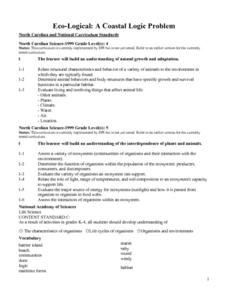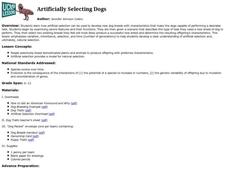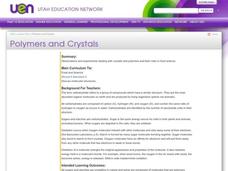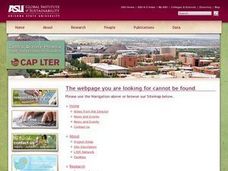Curated OER
Plot Studies
Third graders are introduced to how to properly read a plot map. As a class, they take a field trip to an area surrounding the school and work together in groups to examine small sections of the different environments. To end the...
Curated OER
Eco-Logical: A Coastal Logic Problem
Fourth graders study the characteristics of five coastal communities. They use logic cards and matching activities to identify the proper community for plant and animal species.
Curated OER
The Rain Forest of Costa Rica
Fifth graders examine and discuss the topography, climate, natural resources and artwork of Costa Rica. They develop a diagram of the layers of the rain forest, and design a tourist brochure or advertisement promoting Costa Rica's...
Curated OER
Discovering Local Food Chains
Fourth graders study about food chains. With the assistance of a local biologist, Students hike the school trail system. They explore ecosystem and collect data by charting the organisms found and identifying the energy source. They...
Curated OER
Pharaoh Mountain Hike: Investigating Adirondack Life Zones
Students hike a local mountain and examine its life zones. They measure various components at each zone and collect leaf litter at the sites. At the mountain top, students make descriptive observations and complete a handout about the...
Curated OER
Hawaii's Sandy Shores
Investigate Hawaii's sandy shore ecosystem! Start by creating a vocabulary list and having your class complete a KWL chart. Next, pass out the "I think of" sheet. Each learner will then choose a word from a beach bucket and add it to...
University of California
Artificially Selecting Dogs
Selective breeding has resulted in some novel and beautiful or useful dogs over the years. Using the American Foxhound as an example, genetics learners find out how and why they came about. Then, in small groups, they select breeds to...
Curated OER
Cell Theory, Plant And Animal Cell Comparison
Tenth graders study plant and animal cells. In this investigative lesson students draw their own animal cells and label them.
Serendip
Changing Biological Communities – Disturbance and Succession
After cutting down a forest to make a farm, how long would it take the environment to turn an abandoned farm back into a forest? Scholars study this exact scenario while they interpret many charts and graphs of the changing ecosystems as...
Curated OER
Solid Waste and Recycling
Students demonstrate effects of waste on environment and ways of reducing it, observe how much packaging goes into bag lunches each day, and survey their families to assess awareness levels and household recycling practices. Lessons all...
Curated OER
Pollination of Flowers by Moths
Turn your classroom into a pollination station as your kids transform into moths or predators trying to survive and aiding in plant reproduction along the way. Using silent party blowers as proboscises, the moths will have two minutes to...
Curated OER
it's Lonely At The Top
Young scholars explore the differnences between food producers in food webs and food consumers in food chains. Behavioral choices of primary and secondary consumers such as herbivores, vegetarians, carnivors, and omnivors are analyzed.
Curated OER
World of the Pond
Field trip! The class will review what they know about organisms that dwell in freshwater ponds, then trek down to the old water hole to collect specimens for examination. This includes several web links, useful tips, and an excellent...
Curated OER
Polymers and Crystals: Their Role in Food Science
Blend chemistry with cooking in this exploration of polymers, carbohydrates, and food science. Experimenting with gelatin produces concrete examples of the bonding and ploymerization discussed in the lesson. Copious, comprehensive...
Curated OER
Where is Shirley the Elephant?
Young animal lovers engage in a lesson that's all about elephants. They access an elephant sanctuary website and read a story about Shirley the elephant. They perform a series of activities based upon that story, and also study about the...
Curated OER
Visual Vocabulary
Students interpret and name the vocabulary termed acted out by the mime. In this science/language arts/physical education instructional activity, students are given a set of vocabulary terms to discuss within their group. Next, students...
Chicago Botanic Garden
Leaf Litter Ecology Lab
Some organisms spend their entire lives in leaf litter. The third in a series of six is a great lesson exploring the community of leaf litter. Groups gather and then spread leaf litter over white paper and remove leaves/twigs while...
Curated OER
Using Venn Diagrams to Compare Two Ecosystems
Students explore the distribution of two ecosystems on a global scale; and map the distribution of tropical and temperate rain forests throughout the world. They use a Venn Diagram to describe these ecosystems and the differences between...
Oklahoma State University
Hairy Heredity
Young scholars learn that heredity comes down to the flip of a coin with this cross-curricular math and science lesson. Using smiley faces as a model, students toss coins to determine which dominant or recessive traits...
Desert Museum
Daisy Ecology
Here's a fine lesson that combines poetry with life sciences. Learners carefully listen to a poem that's all about a food chain. As the poem is read, learners name the producer, the herbivore, the carnivore, and the omnivore. Lots of...
Curated OER
Exploring Microclimates
Students compare the land cover and temperatures in different microclimates to begin to explain why organisms live where they do. While exploring microclimates, students record temperature readings and detailed observations.
Curated OER
When Ants Fly
Here is a great instructional activity on constructing line graphs. Learners identify common characteristics of birds, ants common needs of all living things. They also write a story from the perspective of an ant or a bird that has lost...
LABScI
Cell Diffusion and Permeability: The See-Thru Egg Lab
Create a model to study a microscopic phenomenon. The seventh of 12 lessons uses an egg (without its shell) to represent a cell membrane. Using different solutions, learners explore the concept of cell diffusion. They monitor...
Curated OER
Become an Expert
Students are assigned a separate species of plant or bird to research. Using a worksheet, they are responsible for finding a variety of information on their assigned plant or bird. They also complete a mini-poster and give an oral...























